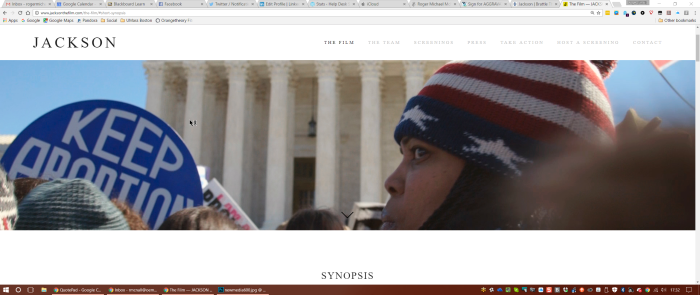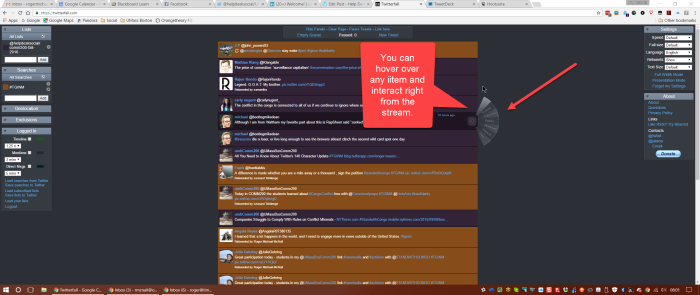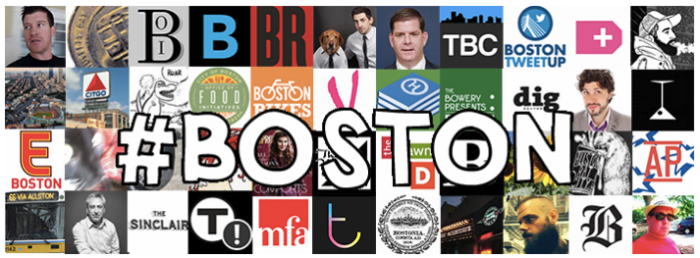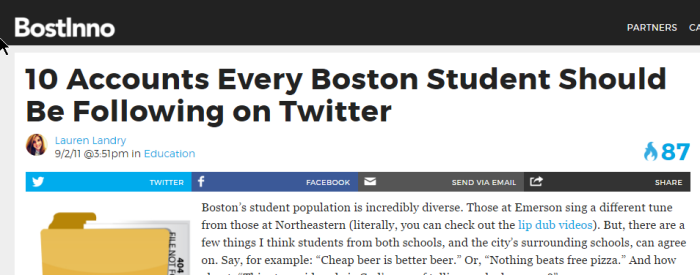Question(s):
- (“The Internet”) What is it about Digital Immigrants that keeps them from being as excited to learn a new web application or web browser “by feel” as is described starting on page 31?
- (“Learning to Think in a Digital World”) If “…no human being was born to read.”, as is stated on page 36, why is it harder for the brain of a Digital Native to learn to read or to dedicate the time to read, etc.? Conversely, shouldn’t the Digital Immigrant whose brain is a “reading brain”, welcome the additional work of the cognitive exploration and additional knowledge of the digital mode even more readily?”
Response:
- I am sort of the “Technology Help Desk” for a majority of my friends, and especially my family. My parents call me regularly for help and assistance with his technology. I’m a bit older than what I think is considered a “Digital Native” but my father was very much interested in providing us with technology and resources growing up. We had an Atari 2600, a Commodore PET computer, and other devices and gadgets, (like Xerox typewriters that had floppy drives and small monitors with memory.)
All that to say that early on in my childhood and throughout my growing up, I was constantly experiencing the “learning by feel” described in our text. We would acquire most of our technology second or third hand and often without instructions, or any prior experience with these devices or the software and tools required to operate them.
So, because of this it always surprises me that even though my father was encouraging us and driving us to learn technology and to embrace these changes, he himself resisted them with fervor. To this day he refuses to have a cell phone, and despite being fascinated with my mother’s tablet, continues to use his old Windows desktop machine.
Recently my parents called me because they needed to sign a rental agreement. (They rent the house we were raised in to my younger brother and his family.) My father told my mother he was sure there was a way to sign the form without printing it, signing it by hand and scanning it. My mother was lost and called me.
I had “digitally signed” documents in the past using Docusign, but I had never created one before. After 30 minutes of walking my mom through how to start a Google Hangout, (she tries really hard, but it seems like she gets quickly frustrated by UI that she’s unfamiliar with), I was finally able to see her screen and walk her through how to add a signature to the document.
When we had finished she said, “You have so much knowledge, it is really surprising.” I laughed and told her that I had never done that before and I just clicked around the site till I figure it out. I added that whenever I get stuck, I just Google “How do I…” and most often find the answer easily.
My father is a reader. My mother is a reader. They both have extensive knowledge in what interests them and both have read most of their lives for pleasure and for knowledge. I’m not sure what it is about their “reading brain” that doesn’t allow them to see the benefits of the digital mode.
It makes me wonder if my helping them, rather than making them “finding their own way” has been what has limited their ability to learn this sort of cognitive exploration. I’m not sure what causes generations to stop their learning and exploring at a certain point in time.
For example, I look at my own experience. As much as I love and use technology, apps, social media, and digital communication. It’s a struggle for me to understand and want to use messenger apps like Whats App, or “disappearing media” apps like Snapchat. There’s a difference in the type of connection that is made on these apps vs. Twitter or Facebook, that is one to one focused. There’s a gap for me there that I didn’t purposely create and even though I have a Snapchat account and try and explore and use it, I’m not sure I “get it”.
Reading: Shirky: “Here Comes Everybody: The Power of Organizing Without Organizations” Pgs: Chapter 1
Question(s): The end of page 17 and beginning of page 18 define what Evan did as: “What he did was to work out a message framed in big enough terms to inspire interest, yet achievable enough to inspire confidence. (This sweet spot is what Eric Raymond, the theorist of open source software, calls “a plausible promise.”)” What does a plausible promise mean? How is it displayed in Evan’s story or other examples?
The end of page 21 and beginning of page 22 states “…we are living in the middle of a remarkable increase
in our ability to share, to cooperate with one another, and to take collective action, all outside the framework of traditional institutions and organizations.” Then, the chapter ends with the words, “These changes will transform the world everywhere groups of people come together to accomplish something, which is to say everywhere.”
Was this book written before or after crowdfunding? How does crowdfunding play into what is being described here?
Response:
The Plausible Promise is summed up by https://civicactions.com/blog/intro-to-the-plausible-promise-tool/ in this way: “(It) is the personal value that individuals get from joining a movement.” Reddit was founded in 2005 and since has 234 million active users (http://expandedramblings.com/index.php/reddit-stats/). Facebook was founded in 2004 and has 1.71 billion active users (http://www.statista.com/statistics/264810/number-of-monthly-active-facebook-users-worldwide/) just two examples that show these mediums that allow individuals to inspire interest and confidence have grown exponentially faster than other mediums of the past.
It is displayed in this story because Evan was able to quickly and easily inspire saying, “I need Help” and then the help he needed was attainable, to the people hearing the message, through the very medium they were receiving the message through. If he had send out a penned letter via snail mail, the immediacy of action would not have existed. Even if someone were inspired to help, the effort they would have needed to make in order to Help would have been far greater. Adding the simplicity of “opening a new browser tab” and typing into search engine, as you are reading Evan’s site certainly added to the ease of entry to joining this cause.
From Freedman and Nutting we learn that Kickstarter launched in 2009 and since has hosted 256,000 campaigns. http://www.freedman-chicago.com/ec4i/History-of-Crowdfunding.pdf
Building from there we see the emergence of sites like GoFundMe who focus on donation based crowd funding. This idea that individuals can join a cause and get both the social value (earning a social badge or posting to social media accounts), in addition to the personal value.
I’m interested to see if and how “gamification” grows, and apps like Swarm (formerly Foursquare) or Untappd continue to find ways to turn users every day activities into “a game” and how that will impact the intersection of “the personal value that individuals get from joining a movement.” and social ranking.


















